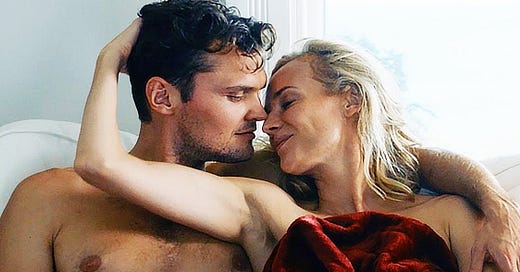Out of the Blue
This flaccid film noir from Neil LaBute wants to evoke the allure of timeless classics like "The Postman Always Rings Twice." But it lacks any sense of surprise or temptation.
Even before “problematic” was a watchword, it seemed like it was made for Neil LaBute.
He became known for Y-chromosome-dominated movies like “In the Company of Men” and “The Shape of Things” that explored modern male impulses with a caustic eye. I took his stories as critiques of misogynistic attitudes, but many observers saw them as condoning or even promoting abusive behavior toward women.
So I was interested in his latest feature, “Out of the Blue,” because it’s a very self-conscious homage/recreation of the film noir genre — known for stories of good people tempted to commit malevolent acts, often for the sake of twisted love. Diane Kruger (“Inglourious Basterds”) stars, and she certainly has an air of the old-school femme fatale about her with her icy blonde looks.
Alas, it’s a flaccid, predictable affair that telegraphs every punch and doesn’t engross us in the characters’ plight. It’s also trying too hard to crib from classics like “The Postman Always Rings Twice” — even going so far as to have the New England town where it’s set named Twin Oaks, the same as that movie.
Truthfully, I had a hard time getting through “Blue.” I kept trying to think what it does that “Body Heat” didn’t already do much, much better. Even the sex and violence are rather tame — certainly compared to Kathleen Turner and William Hurt’s fiery coupling — so the movie can’t even offer lascivious appeal.
The final result is a movie that feels stuck out of time, with the look and sensibilities of a modern film but themes recycled from the 1940s. It even uses old-timey title cards for the (unintentionally hilarious) time transitions, like “A Different Afternoon” or “Not Long After That.”
The biggest failing is the main character, an affable, mop-haired dope in his early 20s named Connor (Ray Nicholson). He works as a junior staffer in the town library, does a lot of jogging around the seashore and… that’s about it. He has that annoying Gen Z quality of always looking around and smirking to himself while conversing with others, as if he can’t just exist in the moment but has to curate and comment upon it while it’s happening.
In the very first scene he meets Marilyn (Kruger), a beautiful woman roughly twice his age swimming at the beach. She wears an old-fashioned one-piece red suit that, coupled with her name, hearkens back to a bygone age. They chat a bit and flirt, and we’re not surprised when she begins showing up wherever he’s at, dropping hints that an older, smarter man would’ve picked up on much earlier.
Very soon they’re involved in a torrid affair. She’s married to a rich, abusive guy and sometimes turns up with bruises, which arouses Connor’s sympathy and anger. Marilyn also has a snotty teen step-daughter (Chase Sui Wonders) who will inherit all the money should anything happen to her dad.
We learn there’s something very dark and upsetting in Connor’s past. He has a hardcase probation officer, Jock (Hank Azaria), who appears from time to time to ride him and lay down veiled warnings. There’s also a local sheriff’s deputy (Frederick Weller) who openly harasses him, glaring and spouting threats so over-the-top even Charles Bronson would be afraid to utter them.
Somebody needs to be booked for badly attempted comedy.
You can guess where this all goes: Connor, who’s a young man and thus equates sex with love, is bedazzled by Marilyn and doesn’t realize she’s playing him like a $10 fiddle. A plot is hatched to do away with her husband, things will go awry, the lovers will begin to trade accusations, paranoia closes in, etc.
Meanwhile, Connor has a coworker at the library named Kim (Gia Crovatin) who’s bright, full of verve and dresses like a fetching Rhode Island version of Annie Hall, complete with ties, trousers and hippie hats. Any young man of substance would instantly be smitten with her, and we could leave aside all the grubby trysts and murder plots.
The audience is supposed to identify with and empathize for Connor, but instead we resent him for being so dense and obeying his urges instead of following his brain. Kruger’s Marilyn is so transparently malevolent and manipulative that she winds up not having any mystery to her. A late plot twist feels tacked-on, and tacky.
The title of “Out of the Blue” implies it’s something sudden and surprising, when really all it is is rehash of old material that has nothing new to say. I kept waiting for writer/director LaBute to take some swerve into the unknown or approach the material from an ironic angle… anything, really.
Instead, it’s a whole lotta ham-handed obviousness — something I definitely have a problem with.





